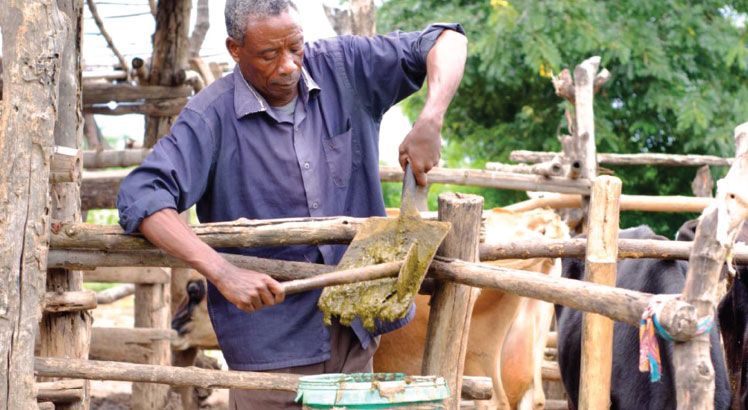Biogas for common good
C
lement Kandodo,29, spent many happy days in the fields with his farmer parents whom he holds up as role models.
“My father was a successful farmer in our community, a lead farmer. This made me proud as a child because I would brag about his success wherever I went. I was a hero among my peers,” he recalls.
However, Kandodo realised at a young age that not all that glitters is gold.
“My father was having difficulty obtaining fertiliser. It was too costly for him. He sometimes had to sell some livestock to buy fertiliser,” he explains.
Kandodo had a burning desire to find solutions to those challenges. He set his heart on going to Bunda College of the Lilongwe University of Agriculture and Natural Resources (Luanar). His wish was granted in 2012 when he was selected to study crop and soil science.

“Studying agronomy was like completing the puzzle. Just as I was yearning for low-cost farming methods, one of the lecturers brought up a topic about how to make organic fertiliser and cooking gas from waste. This was a huge inspiration for my career,” he states.
His interest in agriculture, environmental conservation and concerns over youth unemployment drove Kandodo, now a Yali fellow, to launch EcoGen, shortly after graduating in 2016.
Situated in Lilongwe’s Falls Estate, his company provides technology that allows people to convert food waste, animal waste or farm waste into biogas for cooking, fertiliser, pesticides and animal feed.
In the backyard of his office is a demonstration site, displaying different crops and how the technology works.
EcoGen touts its technology both as a solution to Malawi’s deforestation and waste management problem.
Kandodo dubs the ‘waste’ in the biogas digester brown gold, as it is a very efficient fertiliser. He is overjoyed that the technology allows him to kill more than two birds with one stone.
“I am ecstatic about this technology. Even in the backyard, this system can be installed. The digester consumes food scraps or livestock waste. So, while it can produce cheaper organic fertilizer, it is also the most efficient way to manage waste.”
According to the United Nations Development Programme, city councils in Malawi only collect about 12percent of the waste created in their areas, with private waste collectors filling the void. Poor coordination among household waste generators, waste collectors and recyclers makes the problem worse.
The National Anti-Charcoal Strategy shows that about 97 percent of Malawians cook using illegal and unsustainable charcoal and firewood.
Kandodo explains: “Another significant advantage of using this technology is gas production. It is an answer to women like my mother who used to walk long distances in search of firewood, because once this technology is installed, that household will be able to not rely on charcoal or firewood for cooking but gas—and in the process they are no longer walking long distances to fetch firewood or spending more on charcoal, thereby preserving trees,” Kandodo said.
EcoGen’s target population is diverse and includes farmers, households, and organizations such as hospitals and schools.
The company has won awards for assisting farmers like Yohane Chawoloka of Dedza. His family now cooks with gas and uses bio-fertiliser instead of chemical fertiliser, which he makes from chicken, cow, and pig waste.
The farmer cultivates maize, beans, groundnuts, potatoes, and cassava, but he also produces milk and has livestock. To Chawoloka, organic waste has become a source of multiple solutions to the problems he faces as a farmer.
“I am sorry because I have been discarding waste for over 30 years, allowing it to decay in the air and pollute the environment. But after hearing about this technology from EcoGen, I knew I had to have it installed in my backyard,” Chawoloka said.
“I am now saving a lot of money because I now use organic fertiliser that I harvest from the biogas technology,” he continued.
Ministry of Agriculture spokesperson Gracian Lungu said that farmers are encouraged to produce organic fertiliser, which farmers complement with chemical fertiliser to maximise their production.
“The nitrogen percentage doesn’t reach the needed 23 percent in basal dressing and 46 percent in top dressing. The most benefits one gets from organic manure is that they are cheap and they restore soil fertility,” he said.
The country’s National Energy Policy of 2018 has prioritised the use of biogas, especially in government institutions such as schools, hospitals and prisons.
“The government is promoting using technologies that are clean, modern, affordable and efficient,” Ministry of energy’s Public Relations Officer Upile Kamoto-Lali says.
Wellam Kamthunzi, a lecturer in agricultural engineering at Luanar, believes biogas technology to be both economical and environmentally friendly.
“By using animal waste to produce biogas, you do not lose the fertiliser value, but you improve the fertiliser value while gaining energy in the form of natural gas for cooking and even running engines,” he explains.
Kamthunzi suggested that cities, municipalities and towns use digesters for waste management and that large livestock producers be encouraged to produce biogas from livestock waste.
“All organic waste that ends up in landfills, like those run by the cities of Lilongwe and Blantyre, can be used to produce biogas,” he said.






One Comment